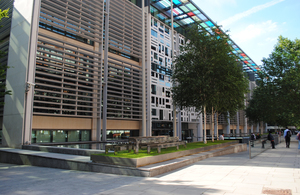England returns to Plan A as regulations on face coverings and COVID Passes change today
- From today and because of the success of the booster rollout, all measures under Plan B have been lifted meaning face coverings are no longer mandatory in indoor venues
- COVID Passes are now voluntary for large events and nightclubs and people are no longer being advised to work from home
- It comes as hospital admissions stabilise, Omicron infections decline and the number of people in intensive care with COVID-19 continues to fall
From 00:01 on Thursday 27th January England returned to Plan A measures following the huge success of the vaccination programme and falling Omicron infections.
Plan B measures were initially introduced on 8 December 2021 to slow the spread of the Omicron variant and buy time for scientists to better understand it and get more jabs in arms. The Get Boosted Now appeal was launched, bringing the date for all adults to be offered a booster to the New Year.
This target was reached, and over 37 million boosters have now administered. The vaccination programme has succeeded in reducing the risk of severe infection and hospitalisations, easing pressure on the NHS. Hospital admissions have now stabilised and the number of people in intensive care units with COVID-19 continues to fall.
As of today the lifting of Plan B means:
- mandatory COVID-19 certification will end, but venues may choose to use the NHS COVID Pass voluntarily;
- face coverings will not be required by law in indoor venues;
- local directors of public health are still able to recommend face coverings in communal areas only in education settings within their area, but only where the department and public health experts judge the measures to be proportionate – this is a temporary measure;
- infection prevention control guidance continues to require face coverings be worn in health and care settings, including primary care and pharmacies;
- it is suggested that people wear face coverings in crowded and enclosed spaces where they might come into contact with people they do not normally meet; and
- it is still a legal requirement for those with COVID-19 to self-isolate for 10 days with the option to end self-isolation after 5 full days following two negative LFD tests.
As of Wednesday 19 January, the government no longer asked people to work from home. People should speak to their employers about arrangements for returning to the office, and should follow the Working Safely guidance.
Health and Social Care Secretary Sajid Javid said:
The tireless efforts of NHS and care staff, and the army of volunteers, as well as the phenomenal response of the British public means over 37 million people have been boosted. I want to thank everyone who has come forward to Get Boosted Now.
Our vaccines, testing and antivirals ensure we have some of the strongest defences in Europe and are allowing us to cautiously return to Plan A, restoring more freedoms to this country.
As we learn to live with Covid we need to be clear eyed that this virus is not going away so if you haven’t already – please come forward for your first, second or booster jab.
Today’s changes follows a review last week of data including infections, vaccine efficacy, COVID-19 pressures on the NHS, workforce absences, public behaviours, and views from the scientific community.
Vaccines continue to be the main defence against COVID-19 with data from the UK Health Security Agency (UKHSA) showing a booster is 92% effective in preventing hospitalisation from two weeks after it is administered and is 65% to 75% effective against symptomatic infection from Omicron. More than 83% of people aged over 12 in the UK have had their second dose and of those eligible, 81% have received their booster.
Though infections continue to fall, Omicron remains prevalent across the country – especially in the young and the elderly. Remaining cautious and taking precautionary measures is vital alongside vaccines and testing to control the spread of COVID-19. As the virus becomes endemic, the government will set out a long-term strategy for living with COVID-19 and replacing legal requirements on self-isolation with advice and guidance urging people with the virus to be careful and considerate of others.
The government and the UK Health Security Agency continues to monitor new variants to keep the country safe and are working with the World Health Organisation (WHO) and other national public health bodies to establish the International Pathogen Surveillance Network to improve surveillance around the world. The UK is also providing world-leading genomic sequencing capability through the New Variant Assessment Platform (NVAP).
Background information
The changes are not subject to vote as the regulations mandating face coverings in certain settings, and the use of COVID-19 passes have been allowed to expire, as of 23:59 on Wednesday 26 January.
To help do your bit as we learn to live with COVID-19, you should:
- Let fresh air in if you meet indoors, meeting outdoors is safer;
- Get tested, and self isolate if required;
- Continue to wear a face covering in crowded and enclosed spaces where you may come into contact with other people you do not normally meet;
- Try to stay at home if you are feeling unwell;
- Wash your hands;
- Download and use the NHS COVID-19 app;
- If you haven’t already, Get Boosted Now;
- Confirmatory PCRs are no longer required after positive lateral flow results;
- Given the accessibility of LFDs, positive cases can end their self-isolation period after 5 full days if they test negative on day 5 and 6; and
- Fully vaccinated contacts can also avoid isolation by testing daily with LFDs.
